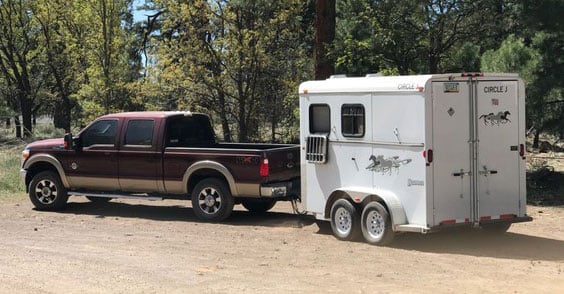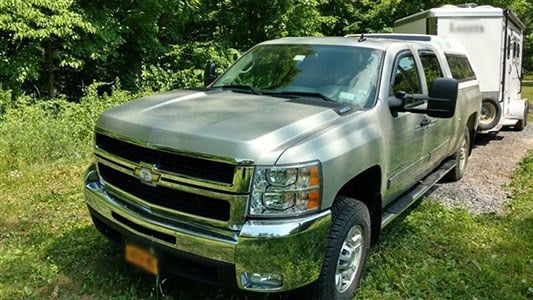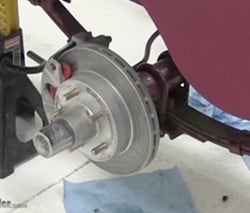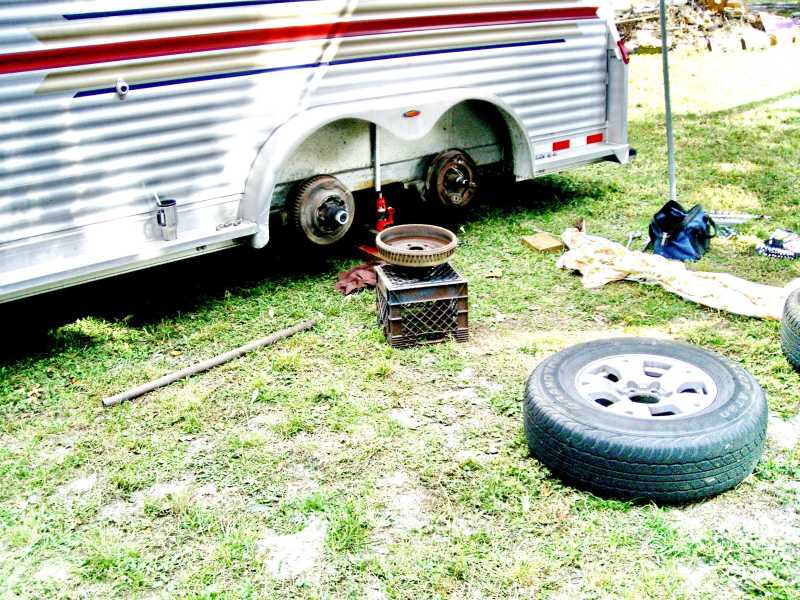Horse Trailer Brakes: What You Need to Know Before Buying Your Trailer
Is there a new horse trailer in your future?
If you’re looking to buy a horse trailer, you probably have all kinds of features in mind. You’re probably considering price, comfort, and ease of towing with your existing vehicle, or maybe you’re combining the purchase of the trailer with a new truck.
There’s lots to think about and it seems every detail – big or small - is important. But let’s face it - you’re probably only thinking of getting out on the open road with your horse or horses. But stopping a trailer is just as important as getting out there on the road. There are some things you need to know about one of the most important safety features on your trailer, the brakes.
In this article...
- Is this your first trailer?
- Safety First
- Do horse trailers really need brakes?
- Common Brake Types
- Which is better for a horse trailer - hydraulic or electric?
- How can I check to see if my trailer has brakes and what kind they are?
- Can I add better brakes later?
- Why Horse Trailer Brakes Matter
Is this your first trailer?

If this is your first trailer, there are probably still lots of things you need to learn. You’ll need some time to get used to the trailer, which makes it even more important to be sure that you cover all the bases when it comes to picking out the right features. We can’t stress enough to learn as much as you can about being on the road with your horses and trailer before heading out.
Maneuvering a trailer with a 1400-pound horse - and all the gear - is not the same as taking a trailer to the hardware store for some garden supplies. You’ll have a lot to think about. You’ll probably be driving in all types of weather and on many different types of roads and, at varying speeds. Seasoned horse-trailer drivers know that travelling with horses can be unpredictable, and there’s only one way to learn – you’ll have to get out there and do it yourself.
You won’t be out there alone on those roads – other drivers, stray animals, and the wind and rain will affect your driving speed. But one thing is for sure – being certain you can stop when you want is one less thing you’ll have to worry about.
Safety First
When it comes to hauling your horses, nothing is as important as safety. Whether you’re going for a ride nearby with friends or traveling to a show across the country, you want to know that you’ve got the right brakes installed on your trailer and that they’re fully functional.
Brakes on the axles of your trailer will help you bring it to a gentle stop instead of risking slamming around your horses and their gear. The breakaway brake is even more valuable because it also protects other drivers should your horse trailer try to find its own ride home.
Sudden, jarring braking is hard on your horses, but it’s also hard on your equipment. Very tall trailers risk twisting or toppling with hard braking if they’re depending solely on the truck’s brakes to stop them -- that’s a disaster everyone around you would rather avoid. Properly designed brakes are important to ensure that your trailer stops when it needs to, without any extra drama.
Do horse trailers really need brakes? Won’t my truck’s brakes do the job?
 In 31 states, you’re required by law to keep well-working brakes on any horse trailer with a gross vehicle weight (GVW) of more than 3,000 pounds. The trailer itself has its own weight, called the unladen weight (the trailer as it is equipped with any mats, spare tire, etc. but empty of its load) so adding anything to the unladen weight increases the GVW. Simply put, the GVW is the actual weight of the vehicle (trailer) and its complete load.
In 31 states, you’re required by law to keep well-working brakes on any horse trailer with a gross vehicle weight (GVW) of more than 3,000 pounds. The trailer itself has its own weight, called the unladen weight (the trailer as it is equipped with any mats, spare tire, etc. but empty of its load) so adding anything to the unladen weight increases the GVW. Simply put, the GVW is the actual weight of the vehicle (trailer) and its complete load.
Unless your horses are small, or you have only one horse who likes to go on trips, you’ll easily exceed this weight limit. Even if your trailer is light and only hauls miniature ponies, it’s a good idea to stick to trailers with brakes to provide a smoother ride for your equine passengers.
Small trailers with gross vehicle weights of under 4,000 pounds - like the tiny two horse trailer pulling your ponies - may only need brakes on one axle, but bigger trailers, like the gooseneck horse trailer you take on long trips, require brakes on both axles. Also, if you If you tow over 4,000 pounds – likely three or more horses or a trailer with living quarters - you should also choose a trailer with brakes on both axles.
In simple terms, without brakes, the trailer will push against your vehicle every time you stop. If there is a sway, the trailer can jackknife because there is nothing to control it. If you are traveling at 55 mph and you try to stop quickly, you will most likely lose control of your vehicle at this point.
Common Brake Types
There are two types of brakes commonly available, with a third type being installed in trailers with living quarters. They are:
-
Electric
-
Hydraulic
-
Breakaway
Electric Brakes
 Electric brakes allow the driver to control the trailer’s brake system manually from inside the cab of the truck. Electric brakes need a controller which should be easily accessible for rapid activation. When you step on the tow vehicle brake pedal, the trailer brakes are activated just slightly after the tow vehicle brakes are activated.
Electric brakes allow the driver to control the trailer’s brake system manually from inside the cab of the truck. Electric brakes need a controller which should be easily accessible for rapid activation. When you step on the tow vehicle brake pedal, the trailer brakes are activated just slightly after the tow vehicle brakes are activated.
These brakes work by using an electromagnet as the activating mechanism. The trailer brakes are activated by pushing the brake pads onto a brake drum. The applied pressure is proportional - the controller senses how quickly your towing vehicle is stopping, and it applies the same amount of towing power to the trailer brake.
Electric brakes are also best for off-roading because they still work on rough and uneven terrain.
This type of brake gives the driver greater control over the braking power. Electronic controllers automatically adjust to the tow vehicle, or you can manually adjust the pressure to the brakes using the settings. This ability to modulate the settings is important when towing heavy loads or climbing hills. Most times though, the brake settings are established when you install the controller, so generally, it’s a “set-it-and-forget” situation.
When purchasing a used trailer, make sure you check the plugs on the electrical connections for corrosion, which is common for older equipment. Clean the plug thoroughly or replace it altogether. Don’t forget that the wiring should be connected to your vehicle’s battery. Make sure you check the battery as well. That is one last item to check on the list!
Hydraulic Brakes
Hydraulic (or surge) brakes are dependent entirely on resistance originating from the towing vehicle. When pressure is applied to the towing vehicle’s brakes, the pressure is also applied to the trailer’s brakes. The faster the towing vehicle slows down, the faster the trailer will slow down, as greater pressure is applied.
The downside of this type of brake is that its efficiency is entirely dependent on the towing vehicle. This works great in principle when you’re going forward, but its not so effective when you’re driving in reverse. Also, you cannot separately actuate the trailer brakes if the trailer is swaying or you’re going down a steep hill.
Hydraulic brakes have no controlling device inside the cab.
Breakaway Brakes
Many horse trailers, especially very large horse trailers with living quarters, use a secondary brake as a fail-safe in case the trailer somehow uncouples from the vehicle hauling it. These safety brakes, known as breakaway brakes, are invaluable on long hauls and give the driver a great deal of peace of mind.
Breakaway brakes are powered by a 12-volt battery that’s independent from the rest of the braking system. This safety system is designed to engage the brakes on your trailer for a full 15 minutes should it become unhitched in transit.
Which is better for a horse trailer - hydraulic or electric?

Hydraulic brakes nearly have a 50% shorter stopping distance than electric ones. But what does that mean for your horse trailer? Let’s look at an example.
Say you’re traveling at 55 mph on a dry road, and you hit the brakes to avoid a sudden obstacle. Theoretically, it will take you approximately 170 feet to come to a stop. However, knowing that the average human reaction time is 0.2 to 0.3 seconds, it will take about 300 feet to come to a stop. Given the same speed and conditions, it will take you around 385 feet to come to a stop with electric brakes.
How can I check to see if my trailer has brakes and what kind they are?
When you buy any trailer, new or used, it’s important that you be sure that the trailer has brakes. But how can you find out if it does?
New trailers
When you buy a new trailer, this information is in the technical specifications or in the driver’s manual. If you’re not sure, ask the dealer about it. No question is unimportant when it comes to safety and peace of mind.
Used trailers
If you’re buying a used trailer and you’re in doubt, you can ask a mechanic to answer your questions. Either bring the mechanic (or a mechanical friend!) along with you when you visit and look at the trailer before buying it.
If you don’t have access to a mechanic, there are still a couple of ways you can figure it out on your own!
Look down under the trailer at the wheels – if you see brake shoes, then you know you at least have brakes. Then, look for these features to distinguish the type of brake:
-
If there is a controller in the driver’s cab, they are electric.
-
If there is a cylinder, or small diameter piping around the brake drum, they are hydraulic.
Can I add better brakes later?

Remember too that the brakes will be installed after your purchase and probably done by a third party. It’s likely you won’t get the same level of warranty if it’s a new trailer. But it is better to add them if you’re determined to buy a trailer that doesn’t have them already. Even if it’s a light-weight trailer that technically doesn’t require brakes, you and your horse deserve a safe drive, and to make it home in one piece, so consider adding them.
The best advice we can offer is to buy the trailer with the type of brakes you want from the start. It helps to look at the kind of driving you’ll be doing as well. If in doubt, speak to a professional.
Now You Know Why Horse Trailer Brakes Matter
Pulling a trailer is easy -- you just tug on it, and it’ll follow you wherever you go. Stopping it, however, can be quite another matter.
Pulling a trailer without its own independent braking system increases the chances of an accident, and the possibility of fines for driving with illegal equipment. If you have an accident, you may be held liable for the accident. You, your horse, or other drivers on the road may be injured or killed and no one wants that.
Although you rarely think about them, brakes are one of the most valuable features on your horse trailer, and as necessary as your seat belt or riding helmet.
Safety first. Safety always.
Double D Safety
Safety is number one at Double D Trailers. You can rest assured that when you buy your next bumper pull or gooseneck trailer from us it will come fully equipped with responsive brakes and adequate safety systems to protect your precious cargo.
Contact Brad Heath to find out more about the braking systems on your new trailer.
This article was written by Bernadette Broderick. It was published on 12 February, 2014. It was last updated on 13 April, 2022.
Image Sources

